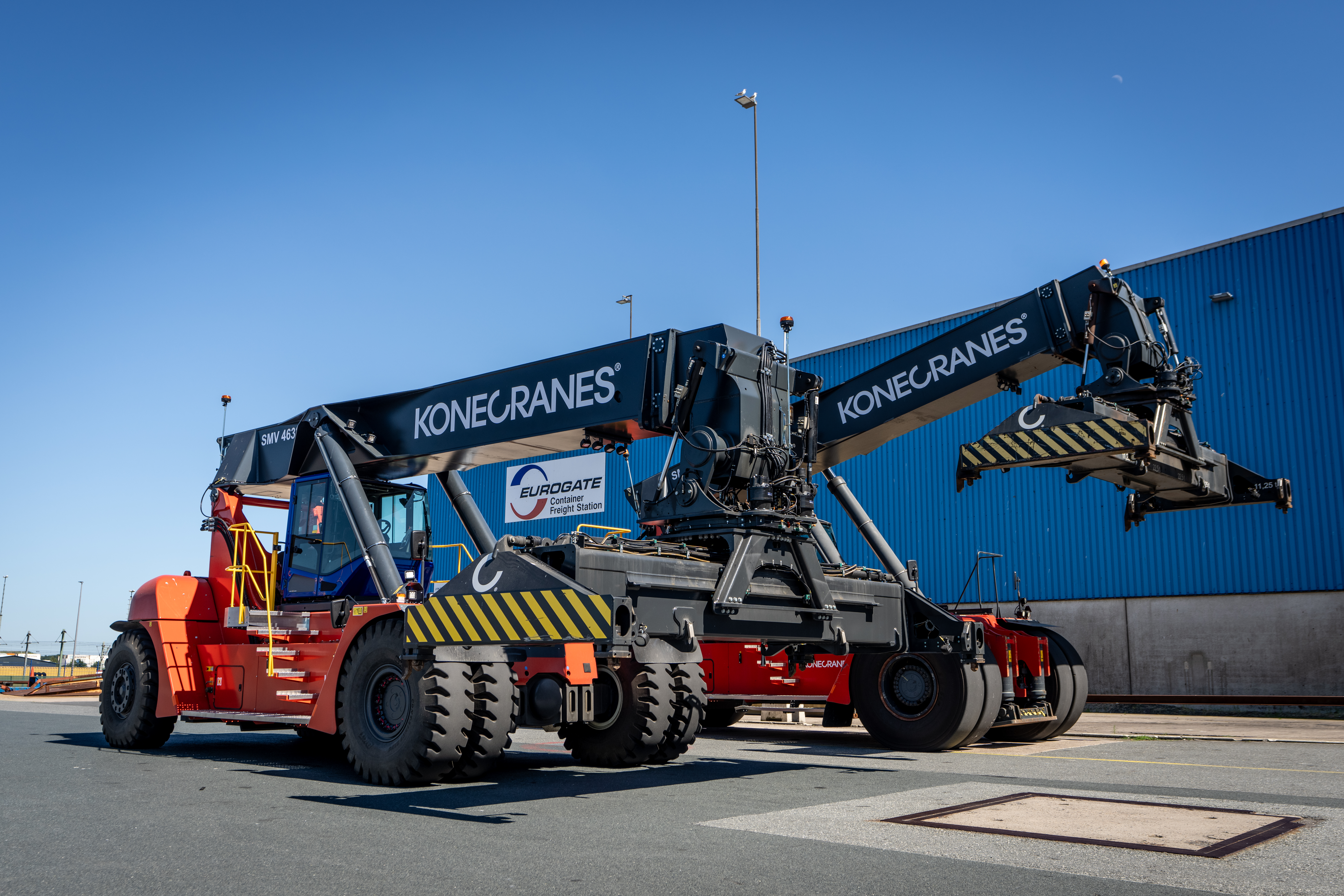"Wir werden Platz brauchen und werden dies Bürgerinnen und Bürgern sowie politischen Entscheidungsträgern erklären müssen."
Isabelle Ryckbost, Generalsekretärin der European Sea Ports Organisation (ESPO), spricht über die ESPO-Konferenz in Bremen und die Herausforderungen, denen sich die Häfen Europas stellen müssen.
Isabelle Ryckbost ist Generalsekretärin der European Sea Ports Organisation (ESPO). Bevor sie diese Aufgabe übernahm, war sie vier Jahre Direktorin der European Federation of Inland Ports (EFIP) und Chefberaterin der ESPO. Nach dem Studium der Rechtswissenschaften und des Europäischen Rechts arbeitete sie in der Europäischen Kommission und in einer EU-Beratungsfirma für öffentliche Angelegenheiten. 1994 begann sie ihre Tätigkeit im Europäischen Parlament, wo sie zunächst als politische Assistentin tätig war.
Frau Ryckbost, in wenigen Tagen findet die ESPO-Konferenz statt, die Sie nun schon zum 10. Mal persönlich organisiert haben. Worauf freuen Sie sich besonders?
Das ist schwer zu sagen. Für mich ist die ESPO-Konferenz der Höhepunkt des Jahres. Natürlich besteht das Ziel darin, Erkenntnisse zu gewinnen und über die großen Herausforderungen nachzudenken, vor denen die Häfen stehen. Aber das Hafengeschäft ist auch ein Geschäft von Menschen. Es macht Freude zu sehen, dass Menschen aus allen Häfen in diesen zwei Tagen zusammenkommen, miteinander reden, lachen und Wissen austauschen. Während der Corona-Pandemie konnten wir die Konferenz nicht durchführen, sodass das Wiedersehen im letzten Jahr eine große Freude war und ich bin überzeugt, dass es auch in diesem Jahr wieder eine sehr schöne Veranstaltung wird. Und wir gehen immer mit dem Slogan an den Start, dass ESPO-Konferenzen mehr sind als bloße Konferenzen, bei denen der Tag mit dem letzten Redner endet, sondern das Networking danach genauso wichtig ist.
Außerdem wird es einen Ausblick auf die wirtschaftlichen Herausforderungen geben, denen sich die Häfen werden stellen müssen.
So ist es. Und erstmals wird es in diesem Jahr auch einen Ausblick auf die Entwicklung der Häfen im Energiebereich geben. Zudem haben wir einen amerikanischen Gast eingeladen, der Experte auf dem Gebiet der internationalen Handelspolitik und des US-Inflationsbekämpfungsgesetzes ist. Wir freuen uns immer auf Redner, die nicht nur nett sind, sondern auch Klartext reden.
Das letzte Jahr war wirtschaftlich und politisch ein turbulentes Jahr. Wie sind die europäischen Häfen mit den Krisen in der Welt umgegangen?
Häfen sind häufig Knotenpunkte für die Industrie und von großer Bedeutung für sämtliche maritime Wirtschaftstätigkeiten – sie dienen Menschen als Anlaufpunkt und verbinden Inseln und Festland miteinander; außerdem sind Häfen seit jeher sichere Zufluchtsorte für Schiffe in Seenot. Sie sind ein wichtiger Sicherheitsfaktor im geopolitischen Kontext für die militärische Verlegung von Truppen und Material sowie für Notfallversorgungsketten. Und nicht zuletzt spielen sie eine entscheidende Rolle bei der Energieversorgung der Wirtschaft und Gesellschaft Europas.
Schaut man sich also all diese Funktionen an und denkt an Covid, den Klimawandel, die russische Invasion in der Ukraine und die zahlreichen Hindernisse, die einer Globalisierung im Wege stehen, dann erkennt man die Herausforderungen, mit denen sich die Häfen konfrontiert sehen. Allerdings haben Häfen schon gezeigt, dass sie sehr widerstandsfähig sind – Bremen ist dafür ein gutes Beispiel.
Wo stehen die Häfen auf dem Weg der Energiewende zur Nutzung erneuerbarer Energien?
Häfen können eine wichtige Rolle spielen, die Energiewende zu erleichtern und als Knotenpunkte für erneuerbare Energien zu einem entscheidenden Faktor werden. Hier kann z.B. Windenergie an Land gebracht, Wasserstoff im- und exportiert und je nach geografischer Lage auch gespeichert und umgewandelt werden. Aber diese Möglichkeiten erfordern auch eine neue Denkweise für die Häfen. Es geht um neue Partner, Stakeholder, wahrscheinlich auch um neue Kompetenzen, die wir im Hafen brauchen, und – noch wichtiger – all dies wird viel Platz erfordern, denn all die neuen Energien benötigen mehr Platz als fossile Energien.
All dies kommt zu den traditionellen Aufgaben der Häfen hinzu.
Richtig. Das sind Herausforderungen, die wir Politikern und Bürgern verständlich machen müssen. Wir haben uns in Europa mit dem Erreichen der Klimaneutralität sehr ehrgeizige Ziele gesetzt. Wenn wir das erreichen wollen, brauchen wir jedoch einen politischen Rahmen, der uns bei der Umsetzung hilft.
Wir werden Platz benötigen und müssen Bürgern sowie politischen Entscheidungsträgern klar machen, dass der grüne Wandel zusätzliche Infrastrukturen erfordern wird. Das bedeutet nicht, dass mehr Bäume gepflanzt werden. Auch das wird dazugehören, aber man wird auch entsprechende Anlagen an Land brauchen, um Energie umzuwandeln und zu speichern – und dafür braucht man Platz und Infrastruktur. Die Häfen werden finanzielle Unterstützung benötigen, denn viele dieser Investitionen werden sich nicht unmittelbar auszahlen. Und wenn wir erneuerbare Energien fördern wollen, aber jedes dieser Projekte blockiert wird, weil wir keine Windräder, Kabel oder Pipelines sehen wollen, die diese Energien mit dem Netz verbinden, dann haben wir ein Problem.
Also bleibt es schwierig.
Die Häfen in Europa verfolgen mehrere Ziele. Sie haben einen Hybridcharakter. Hier treffen kommerzielle und öffentliche Interessen aufeinander – und aufgrund der öffentlichen Interessen spielt nicht nur das Geld, sondern auch der Auftrag zur Nachhaltigkeit eine wichtige Rolle. Die europäischen Häfen haben verstanden, dass die Herausforderungen in der heutigen Zeit so groß sind, dass wir neue Wege des Denkens und der Zusammenarbeit einschlagen müssen.
Vielen Dank für das Gespräch, Frau Ryckbost.
Weitere Artikel aus unserem Magazin, die Sie interessieren könnten:







